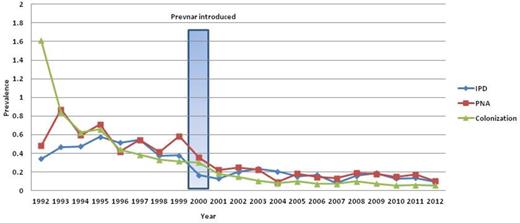Abstract
Background: Streptococcus pneumoniae is a major cause of sepsis, pneumonia and meningitis leading to significant morbidity and mortality. Invasive pneumococcal disease (IPD) and mortality rates in cancer patients (pts) are higher than in the general population. Since the introduction of routine childhood immunization with the 7-valent pneumococcal conjugate vaccine (PREVNAR) in 2000, the overall rate of invasive pneumococcal disease (IPD) decreased in adults in the US. The impact of PREVNAR on rates of IPD in cancer pts is not well studied.
Methods: Retrospective review of pts treated at Memorial Sloan-Kettering Cancer Center from 1991-2012. Unique patient visits per year were obtained from the hospital database. Prevalence was calculated as number of cases per 1000 patient-visits per year. Pts with positive culture(s) for S. pneumoniae were identified from microbiology records. Serotype data is available through 2001. IPD was defined as a positive S. pneumoniae culture from a sterile site such as blood, CSF, or pleural fluid culture. Pneumococcal pneumonia was defined as a positive S. pneumoniae culture from thelower respiratory tract or a positive upper respiratory culture with either radiographic evidence for pneumonia and/or ICD-9 code "pneumococcal pneumonia" or "pneumonia" associated with the positive culture for S. pneumoniae. Colonization was defined as positive culture for S. pneumoniae without IPD or pneumonia. We compared prevalence between "early" (prior to PREVNAR, 1992-2001) and "late" (2002-2012) periods, in those with diagnoses of solid tumors and hematologic malignancies, and between ages ≤21 and >21 years. Pneumococcal vaccination rates were calculated as the number of patients who received any pneumococcal vaccine divided by the number of patient-visits per year.
Results: The mean number of patient-visits per year was 46,394 and 96,954, for the early and late period, respectively. Of 1,033 patients with ≥1 culture positive for S. pneumoniae during the study, 329 (32%) had IPD, 394 (38%) had pneumococcal pneumonia and 310 (30%) had colonization. S. pneumoniae type 6 accounted for 39 (22%) isolates where serotype data was available. The annual prevalence of IPD, pneumonia and colonization gradually declined over the course of the study (Figure 1). Compared to the early period, the prevalence of IPD, pneumonia and colonization were lower in the late period (Table 1). The highest prevalence of IPD was observed in pts ≤21 years of age (2.8 and 1.3 for early and late periods, respectively). The prevalence of IPD in pts with hematologic malignancies was 5-fold higher than pts with solid tumors in the early period (1.8 vs 0.39 respectively; P<0.001) and 3-fold higher in the late period (0.6 versus 0.2 respectively, P<0.001). Only 1% of all pts received pneumococcal vaccine during the late period.
Conclusions: 1) Over a 20 year period we observed a decline in the prevalence of IPD, pneumococcal pneumonia and colonization in cancer patients at a tertiary cancer center in NYC. 2) The prevalence of IPD, pneumococcal pneumonia and colonization was significantly lower (P<0.001) in the late period compared to the early period for the overall population and in high risk groups (≤21 year of age and hematologic malignancies). 3) Rates of pneumococcal vaccination in cancer patients remained low during the study despite the availability of PREVNAR in the late period. 4) Continued efforts are needed to increase rates of vaccination against pneumococcus in cancer patients.
Prevalence for IPD, Pneumonia and Colonization by Period
| . | Prevalence . | ||
|---|---|---|---|
| Period . | IPD . | PNA . | Colonization . |
| 1992-2001 | 0.36 | 0.48 | 0.48 |
| 2002-2012 | 0.16 | 0.16 | 0.08 |
| Prevalence ratio (Early/Late) | 2.25 | 3.0 | 6.0 |
| 95% CI | 2.0-2.7 | 2.6-3.4 | 4.8-7.7 |
| P value | <0.001 | <0.001 | <0.001 |
| . | Prevalence . | ||
|---|---|---|---|
| Period . | IPD . | PNA . | Colonization . |
| 1992-2001 | 0.36 | 0.48 | 0.48 |
| 2002-2012 | 0.16 | 0.16 | 0.08 |
| Prevalence ratio (Early/Late) | 2.25 | 3.0 | 6.0 |
| 95% CI | 2.0-2.7 | 2.6-3.4 | 4.8-7.7 |
| P value | <0.001 | <0.001 | <0.001 |
Abbreviations: IPD, invasive pneumococcal disease; PNA, pneumococcal pneumonia; CI, confidence interval
Kaltsas:Pfizer: Research Funding.
Author notes
Asterisk with author names denotes non-ASH members.


